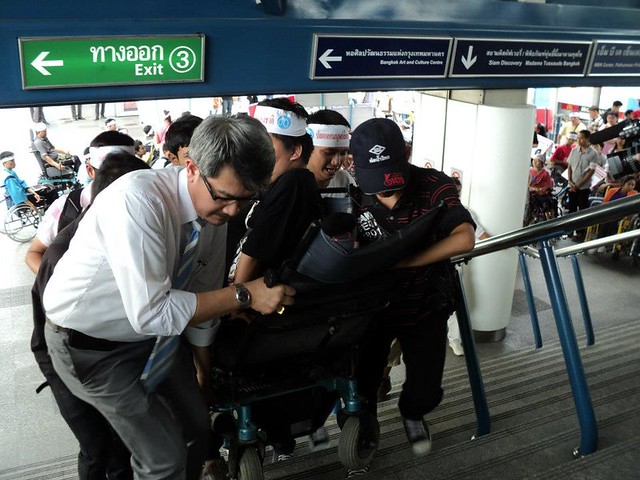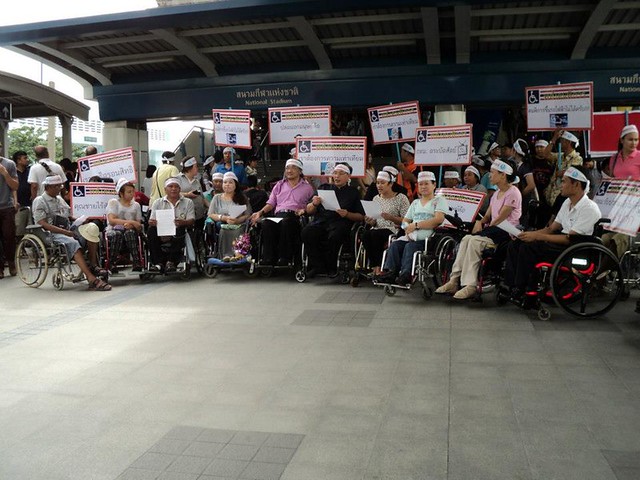The Supreme Administrative Court is scheduled to rule on a case brought against the Bangkok Metropolitan Administration and the BTS Skytrain who are accused of not providing equal access to transportation for physically challenged people. This is the first suit against state authorities in Thailand concerning people with physical challenges.
A network of people in Thailand with disabilities on Monday announced plans to gather at the Supreme Administrative Court on Wednesday to await the historical ruling on a case filed against the Bangkok Metropolitan Administration (BMA) and the Bangkok Mass Transit System Public Company Limited (BTS), the operator of the BTS Skytrain.
“It’s been 20 years since Thailand has had the BTS Skytrain system, but it has never been made entirely accessible to people with disabilities, especially [with regard to] lifts that could assist the elderly and people with disabilities to access the platforms,” said Suporntum Monkolsawadi, the Secretary-General of the Redemptorist Foundation for People with Disabilities (RFPD).
A ministerial regulation of the Interior Ministry, issued on 2005, stipulates that transportation services, hospitals, and department stores must provide means of access, including lifts, for people with disabilities and the elderly.

People lifting a member of People with physical challenges group from Nakhon Pathom Province to get up to the platform of the National Stadium BTS station in central Bangkok to raise awareness on transportation equity in September 2012.
The Administrative Court in 2009 dismissed the case on the grounds that the construction contract of the BTS was signed in 1996, which was before the regulation was enacted. The law cannot have retrospective effect. The case, therefore, was dismissed.
The network fought the case to the Supreme Administrative Court and the verdict will be delivered on Wednesday.
Suporntum pointed out that not all BTS stations have elevators. Moreover, there is only one lift for each station which has many exits. The network calls for the BTS to install lifts at every station exit, so that the disabled do not have to take a taxi to cross the street.
Suporntum added that the fact that the authorities only think about ‘necessity’, but not ‘equality’ when it comes to this issue is discrimination. Moreover, it is unjust to claim that there is no demand to provide transport equity for people with physical challenges because not many of them would use the BTS.
“It is sad that policy makers use this logic, which needs to be immediately reconsidered,” said the activist for disabled people.

A group of people with physical challenges from Nakhon Pathom Province put up banners to campaign for transportation equity at the National Stadium BTS Station in September 2012
“People with physical challenges have been continuously fighting for this to drive a change in Thai society from being ‘charity based’ to ‘rights based’ because the rights of physically-challenged people should be granted on an equal basis with other people and should not be discriminatory. What we are calling for is based on public interest because installing lifts will make it easier for the elderly and people with physical challenges [when commuting on the BTS], as well as pregnant women, people who have to carry goods, and tourists with luggage. It’s obvious that this is a shared public interest, which is not only for the disable according to global standards,” said Suporntum.
Pichet Raktabut, one of the persons who filed a similar lawsuit against the BMA and BTS cited that discrimination against people with disabilities not only exists in the BTS system, but on the MRT (Bangkok’s underground trains) as well.
Although the MRT is equipped with elevators in all of its 18 stations, but of 60 exit gates only half have elevators.
“Moreover, although nowadays the MRT has elevators, most of them are locked and people need to ask for permission to use them, and it takes around 15 minutes for the MRT personnel to come,” added Pichet.

